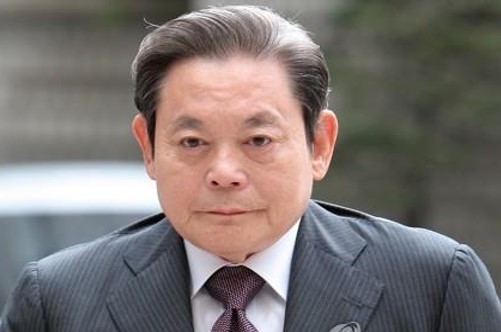Architect of Samsung’s tech revolution, Chairman Lee Kun-hee dies at 78
[Video] Under his 27-year leadership, Samsung became a global powerhouse in chips, smartphones, home appliances
By Shin Ji-hyePublished : Oct. 25, 2020 - 15:06

Samsung Group Chairman Lee Kun-hee, 78, had turned Samsung into a global technology powerhouse and laid the foundation for the rapid growth of the South Korean economy. He died Sunday.
With his death, Samsung formally enters a new era under the leadership of his son, Lee Jae-yong, who has come to the fore to succeed him at the helm of the conglomerate since 2013.
Lee Kun-hee had been bed-ridden since a heart attack in May 2014, with his son acting as the de facto chief of the tech titan. The Fair Trade Commission has recognized Lee Jae-yong as the actual chief of the group since 2018.
Lee Kun-hee took over Samsung, which was a manufacturer of cheap electronics, in 1987, after the death of his father and founder of the group Lee Byung-chull. Many had doubts when Lee Kun-hee declared that he would grow it into a world-class company. But he kept his word and made Samsung a global brand famous for its chips, smartphones and televisions.
Lee Kun-hee was born in Daegu in 1942 as the third son of Samsung founder Lee Byung-chull. He studied at Waseda University in Tokyo and then at the George Washington University School of Business in the US capital.
Upon taking charge, he pushed Samsung with extraordinary tenacity, although his tenure had also been marred by legal troubles and controversies with labor unions.
One of the famous incidents representing Lee’s leadership style came in 1993, when he convened all Samsung Electronics executives in Frankfurt, Germany to urge a fundamental transformation. “Change everything,” he said, “except your wife and children.”
Making great strides in quality and design management, Samsung achieved remarkable growth under Lee’s watch.
According to data compiled by financial information provider FnGuide, Samsung Group’s market capitalization increased 348 times from 900 billion won ($797 million) in 1987 to 318 trillion won in 2014, just before Lee became ill. Sales also increased by 34 times from 9 trillion won to 33.8 trillion won.
Samsung overtook Japan’s Sony to become the world’s No. 1 player in the global TV market in 2006. In the third quarter of 2011, when the Galaxy S2 was introduced to the market in earnest, Samsung gained the top spot in the global smartphone market, beating Apple. It has since held the top spot in the global market in various sectors, including chips, smartphones and home appliances.
“It is with great sadness that we announce the passing of Samsung Electronics Chairman Lee Kun-hee. Chairman Lee passed away on October 25 with his family, including Vice Chairman Jay Y. Lee, by his side,” Samsung said in a statement Sunday morning.
“Chairman Lee was a true visionary who transformed Samsung into the world-leading innovator and industrial powerhouse from a local business. His 1993 declaration of ‘New Management’ was the motivating driver of the company’s vision to deliver the best technology to help advance global society.”
Announcing his death, Samsung said there would be a simple family funeral in accordance with the wishes of the deceased and his family.
Although the group said the wake and the funeral will be held privately, throngs of journalists gathered at Samsung Medical Center, where Lee’s wake is being held. Political leaders and representatives of Korea’s major businesses also paid visits.
Lee Jae-yong, accompanied by his son and daughter, arrived at the hospital at around 5 p.m.
Left bereaved are his wife, Hong Ra-hee, former director of the Leeum Museum of Art; his son, Lee Jae-yong, vice chairman of Samsung Electronics; daughters Lee Boo-jin, president of Hotel Shilla, and Lee Seo-hyun, chief of the Samsung Welfare Foundation; and son-in-law Kim Jae-yeol, president of the Samsung Economic Research Institute.
By Shin Ji-hye (shinjh@heraldcorp.com)








![[Kim Seong-kon] Democracy and the future of South Korea](http://res.heraldm.com/phpwas/restmb_idxmake.php?idx=644&simg=/content/image/2024/04/16/20240416050802_0.jpg&u=)








![[KH Explains] Hyundai's full hybrid edge to pay off amid slow transition to pure EVs](http://res.heraldm.com/phpwas/restmb_idxmake.php?idx=652&simg=/content/image/2024/04/18/20240418050645_0.jpg&u=20240418181020)

![[Today’s K-pop] Zico drops snippet of collaboration with Jennie](http://res.heraldm.com/phpwas/restmb_idxmake.php?idx=642&simg=/content/image/2024/04/18/20240418050702_0.jpg&u=)